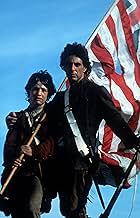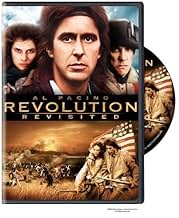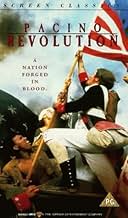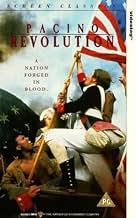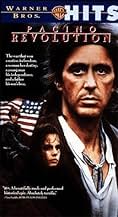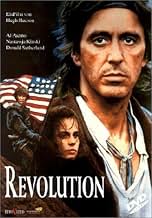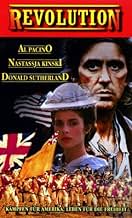AVALIAÇÃO DA IMDb
5,3/10
8 mil
SUA AVALIAÇÃO
Um caçador e seu filho pequeno são atraídos para a revolução americana logo no início, como participantes relutantes, e permanecem envolvidos até o fim.Um caçador e seu filho pequeno são atraídos para a revolução americana logo no início, como participantes relutantes, e permanecem envolvidos até o fim.Um caçador e seu filho pequeno são atraídos para a revolução americana logo no início, como participantes relutantes, e permanecem envolvidos até o fim.
- Prêmios
- 1 vitória e 4 indicações no total
Cheryl Anne Miller
- Cuffy
- (as Cheryl Miller)
Avaliações em destaque
As a high school US History teacher I often use a few scenes from this film in my classes. I have found value in some elements of this dark, brooding, and sluggish film and think it deserves some credit. Examples are: NY City in the opening and closing scenes, (they are our history books brought to life). The battles of NY, specifically Long Island and Brooklyn Heights (the film is vague as to which exact battle this is) the complicated world of Nastasia Kinski's character Daisy, daughter of loyalists, mother yes, but which side is her father really on? Additionally, the miserable conditions at Valley Forge, and very importantly, Tom and Ned "quitting" the war after their first battle (Historically Washington's "grand army" melted away by the autumn of 1776). As a teacher I love the resource of this film. As a parent I want my children to be exposed, As a period movie fan I don't love this film very much.
Searching for some short-length used videotapes, I found the laserdisc version of "Revolution," which I'd never seen. This non-letterbox, TV format version had the usual "talking to air" problem with 2.35:1 movies. Although a scratch and miscellaneous dirt made the picture skip/repeat/wobble, it was an interesting foxhole-level look at the American Revolution. The scenery, set design, costumes, and varied kinds of people made me think that this was Sergio Leone's take on The War for Independence. Was Al Pacino believable as a backwoods English colonist? No, but like a scratch running through a film, the "speech impediment" is overlooked as the tale unfolds. This film, unlike "The Patriot," shows camp followers, Indians on both sides, fighting women, "Not Worth a Continental" issues, lots of dirt and the conventions and results of 18th century warfare. Valley Forge isn't as grim an encampment as paintings and written records reported, but it's a close miss for the English countryside location. Are the characters believable? Hard to tell, since their histories and motives aren't complete. (Having the action jump place to place with jumps in time make this a "fill-in-the-missing-backstory" exercise found in James Clavell's book "Nobel House" series.) Is it an interesting movie? Definitely, and has that 18th century "fleas, dirt, and grease" look that is missing from "The Patriot." 7/10, for presenting issues and motives that turned English colonists into Americans.
Many of the bad reviews of Revolution point out that it is dirty, filthy, disgusting, muddy, messy and uncomfortable to watch. True, true, true.
But... THAT'S WAR!
As a child I thought the American Revolution was the cleanest and most honerable war in history, fought by idyllic patriots on the side of freedom against snooty, smug king-lovers. That's how it was depicted in my childhood history books. But as I got older I realized that the books must have been glossing over something, because it seemed utterly illogical that a war could be so clean and honerable. Wars are desperate and horrible blood-soaked experiences that rip relationships apart, destroy everything, and are fought at ground level by the most uneducated people of all, many of whom really have no choice in the matter and are merely fighting for their own lives.
Revolution demythologizes the American Revolution by dismissing many of the ideal illusions we have about that war in particular. The hero is a self-serving man, who has no interest at all in war, but is forced to fight in it against his will. He's a free man who is forced into virtual slavery to fight for his freedom. Does this make him a bad man? No, he's an honest man who is out for number one, and is motivated mostly by love and loyalty to his son. The war steals everything from him, so why should he be happy about it? There are a few true 'patriots' in this movie, gung-ho idealists like Daisy, but almost everyone else is in the war for selfish motives, to profit from the war, to assert power, to avoid starvation, or for the pure joy of war itself. The redcoats are depicted as rowdy london street-toughs, who are no more or less ignorant & petty than the Americans, only more cocky and egotistical. Their uniforms are ill fitting and poorly miantained. This and a thousand other details give this movie the air of truth. By the end the victory of America is all the more sweet due to the wretchedness the victors must slog through. It's a very noble thing to see war depicted in such realistic ways.
This movie might be too grim to take if not for the great love story at the center of it. Its an entirely unique love story in the history of film, because it demonstrates how a relationship can continue to grow over time even if the lovers are separated from each other for long periods. Daisy and Tom have only a few minutes worth of conversations in the entire movie, and those represent ALL of their conversations. Basically they cross paths from time to time, but they are interrupted every time, and must leave each other, unsure when or if they will ever see each other again. So although they don't really get to know each other or go on dates or have any kind of normal courtship, they nonetheless fall in love, basically thinking about each other over the intervening periods. It is really the war that allows them to fall in love in the first place. Without the war these two people from opposite sides of the social spectrum would never have socialized, and without American freedom they would never have been able to stay together. But in the throes of war all the social rules are off, and these two are so desperate for something good to enter their lives, they fall in love. I don't know why this touched me so much, but it did.
I find this movie emminently re-watchable. I love it. In comparison, Mel Gibson's bad rip-off "the Patriot" is unwatchable to me. It is so full of moral absolutes and is so organized and visually beautiful, I think it does a disservice to the reality of war.
But that's my taste. I love almost every grim-reality war movie. Catch 22, The Victors & Das Boot, to name a few.
But... THAT'S WAR!
As a child I thought the American Revolution was the cleanest and most honerable war in history, fought by idyllic patriots on the side of freedom against snooty, smug king-lovers. That's how it was depicted in my childhood history books. But as I got older I realized that the books must have been glossing over something, because it seemed utterly illogical that a war could be so clean and honerable. Wars are desperate and horrible blood-soaked experiences that rip relationships apart, destroy everything, and are fought at ground level by the most uneducated people of all, many of whom really have no choice in the matter and are merely fighting for their own lives.
Revolution demythologizes the American Revolution by dismissing many of the ideal illusions we have about that war in particular. The hero is a self-serving man, who has no interest at all in war, but is forced to fight in it against his will. He's a free man who is forced into virtual slavery to fight for his freedom. Does this make him a bad man? No, he's an honest man who is out for number one, and is motivated mostly by love and loyalty to his son. The war steals everything from him, so why should he be happy about it? There are a few true 'patriots' in this movie, gung-ho idealists like Daisy, but almost everyone else is in the war for selfish motives, to profit from the war, to assert power, to avoid starvation, or for the pure joy of war itself. The redcoats are depicted as rowdy london street-toughs, who are no more or less ignorant & petty than the Americans, only more cocky and egotistical. Their uniforms are ill fitting and poorly miantained. This and a thousand other details give this movie the air of truth. By the end the victory of America is all the more sweet due to the wretchedness the victors must slog through. It's a very noble thing to see war depicted in such realistic ways.
This movie might be too grim to take if not for the great love story at the center of it. Its an entirely unique love story in the history of film, because it demonstrates how a relationship can continue to grow over time even if the lovers are separated from each other for long periods. Daisy and Tom have only a few minutes worth of conversations in the entire movie, and those represent ALL of their conversations. Basically they cross paths from time to time, but they are interrupted every time, and must leave each other, unsure when or if they will ever see each other again. So although they don't really get to know each other or go on dates or have any kind of normal courtship, they nonetheless fall in love, basically thinking about each other over the intervening periods. It is really the war that allows them to fall in love in the first place. Without the war these two people from opposite sides of the social spectrum would never have socialized, and without American freedom they would never have been able to stay together. But in the throes of war all the social rules are off, and these two are so desperate for something good to enter their lives, they fall in love. I don't know why this touched me so much, but it did.
I find this movie emminently re-watchable. I love it. In comparison, Mel Gibson's bad rip-off "the Patriot" is unwatchable to me. It is so full of moral absolutes and is so organized and visually beautiful, I think it does a disservice to the reality of war.
But that's my taste. I love almost every grim-reality war movie. Catch 22, The Victors & Das Boot, to name a few.
"Revolution" could have been a fascinating story. Unfortunately, it seems that director Hugh Hudson had shot his entire wad when he made the Oscar-winning "Chariots of Fire". Both "Greystoke" and this film were sloppy, choppy messes with no narrative flow. It is confounding, because it is obvious that there was a lot of attention to detail in parts of "Revolution". But only in parts. There is as much here that simply doesn't fit--the most glaring example being Al Pacino performance as a colonial trapper. He apparently forgot what movie he was in, and frequently uses a halting accent very similar to the one he used only two years earlier in Brian DePalma's "Scarface". And I don't think his character was supposed to be Cuban. The rest of the film produces the same effect you would get from flipping through a beautiful set of American Revolution postcards--at random.
Sort of both a proto-PATRIOT (though mildly less-addlebrained) with reverse-elements of LAST OF THE MOHICANS (the Huron are the good guys this time around), this film covers the criminally underrepresented ground of the American Revolutionary War in a generally hackneyed way. I did like the recurrence of some elements in the film, such as how it was really "about" bonding with and protecting sons and how the careers of protagonist Pacino contrasted with oddly-cast British antagonist Sutherland. The two characters feel cartoonish at times as Sutherland carries out several heartless atrocities, exemplifying the un-nuanced way British are often depicted as villains, but he also impressively comes off like an honorable human being at the same time.
There's about as many baffling decisions on display as there are surprisingly good ones. What barely qualifies as a "love story" between Pacino and Kinski never makes sense and it's never clear why bougie but idealistic Kinski gets so enthralled with apathetic commoner Pacino. All of Kinski's scenes slow the film down along with many irritating scenes of Pacino getting wronged and stolen from left-and-right with him usually responding by angrily shouting at someone. The actual battle scenes come off very stiff and awkward, though to be fair that was generally the fighting style of the time.
I do give the film credit for actually recasting one of the characters as he ages instead of relying on goofy makeup or prosthetics. I also give it credit for the ending holding back on the most obvious way of concluding the narrative and reminding us that the characters in the film actually are supposed to be human beings. It is a bit baffling though that since the film was made in Europe with so much British money that they went with Donald Sutherland as the villain with a distracting accent. They could easily have cast any number of local British character actors of the day (say someone ike Anthony Hopkins, Paul Darrow, John Hurt, etc and the film would have been 50% better.
A good looking film with a couple nice surprises and believable production design, but unfortunately weighed down with too many flaws and pacing issues.
There's about as many baffling decisions on display as there are surprisingly good ones. What barely qualifies as a "love story" between Pacino and Kinski never makes sense and it's never clear why bougie but idealistic Kinski gets so enthralled with apathetic commoner Pacino. All of Kinski's scenes slow the film down along with many irritating scenes of Pacino getting wronged and stolen from left-and-right with him usually responding by angrily shouting at someone. The actual battle scenes come off very stiff and awkward, though to be fair that was generally the fighting style of the time.
I do give the film credit for actually recasting one of the characters as he ages instead of relying on goofy makeup or prosthetics. I also give it credit for the ending holding back on the most obvious way of concluding the narrative and reminding us that the characters in the film actually are supposed to be human beings. It is a bit baffling though that since the film was made in Europe with so much British money that they went with Donald Sutherland as the villain with a distracting accent. They could easily have cast any number of local British character actors of the day (say someone ike Anthony Hopkins, Paul Darrow, John Hurt, etc and the film would have been 50% better.
A good looking film with a couple nice surprises and believable production design, but unfortunately weighed down with too many flaws and pacing issues.
Você sabia?
- CuriosidadesUpon its release, this movie was the biggest box-office disaster in British movie history. It scared off city financing for British movies for years, almost single-handedly causing a decade-long financial crisis in the industry.
- Erros de gravaçãoIn battle, the British soldiers are depicted taking short steps; in reality, Redcoats were trained to take long paces, so as to close the range quickly.
- Versões alternativasIn 2009, Hugh Hudson made his own director's cut titled "Revolution Revisited" which was also released on DVD. The new version featured new narration recorded by Al Pacino, a different ending, and removed 10 minutes of footage from the film.
- ConexõesEdited into Give Me Your Answer True (1987)
Principais escolhas
Faça login para avaliar e ver a lista de recomendações personalizadas
- How long is Revolution?Fornecido pela Alexa
Detalhes
- Data de lançamento
- Países de origem
- Idioma
- Também conhecido como
- Revolution
- Locações de filme
- King's Lynn, Norfolk, Inglaterra, Reino Unido(New York scenes)
- Empresas de produção
- Consulte mais créditos da empresa na IMDbPro
Bilheteria
- Orçamento
- US$ 28.000.000 (estimativa)
- Faturamento bruto nos EUA e Canadá
- US$ 358.574
- Fim de semana de estreia nos EUA e Canadá
- US$ 52.755
- 29 de dez. de 1985
- Faturamento bruto mundial
- US$ 358.574
- Tempo de duração
- 2 h 6 min(126 min)
- Cor
- Proporção
- 2.35 : 1
Contribua para esta página
Sugerir uma alteração ou adicionar conteúdo ausente


